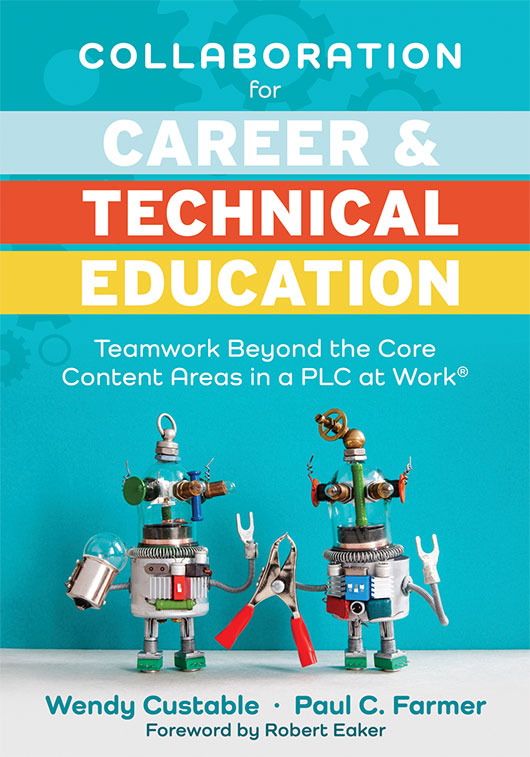Free Reproducibles
Collaboration for Career and Technical Education
This practical resource explicitly outlines how CTE educators can integrate PLC best practices and collaborative team processes into their daily work. Maximize career and technical education for students through research-based teaching strategies.
Benefits
- Become familiar with the common issues that prevent CTE educators from engaging in the collaborative PLC process.
- Learn why and how the PLC process benefits both CTE educators and students.
- Learn how CTE educators can create collaborative programs that are tailored toward CTE fields of study.
- Receive professional guidance and concrete, achievable teaching strategies for creating an effective PLC process.
- Access a checklist of crucial action steps for career tech teams at the end of each chapter.
TABLE OF CONTENTS
Chapter 1: Establishing a Collaborative Culture
Chapter 2: Forming Collaborative Teams
Chapter 3: Setting Up the Logistics of Teamwork
Chapter 4: Identifying Essential Learnings and Developing CTE Curricula
Chapter 5: Designing Instruction and Assessments
Chapter 6: Reflecting on Data
Chapter 7: Responding to Student Learning
Epilogue: Turning Parking Spaces Into Rest Spaces
Appendix A: Glossary of Terms
Appendix B: Reproducibles
Study Guide
PRINTABLE REPRODUCIBLES
Chapter 3
- Figure 3.1: Team Norms
- Figure 3.3: Team Meeting Topics—Monthly Meeting Schedule
- Figure 3.4: CTE Team Collaboration Guide
- Figure 3.5: Team Member Roles
Chapter 5
- Figure 5.2: Roles of the CTE Teacher With Team Assessments
- Figure 5.4: Collaborative Grading Process
- Figure 5.5: Scoring Calibration Form
- Plan for Developing and Administering Assessments With a High-Stakes Format
Chapter 6
Chapter 7
Appendix B
- Developing a Shared Vocabulary—The Three Big Ideas
- Team Strengths and Growth Survey
- Essential Learning Record Keeping
- Unwrapping Essential Learnings
- Scaled Learning Target
- Instruction and Assessment Planning Guide
- Guiding Questions for Establishing CTE Team SMART Goals
- SMART Goal Appraisal
- Question Strengths and Needs Protocol
- Protocol for Auditing Assessment Items
- Analyzing Questions Needing More Study Time
- Protocol for Identifying Student Support Plans
- Protocol for Informing Instructional Best Practices
SUGGESTED RESOURCES
BOOKS
- Bailey, K., & Jakicic, C. (2012). Common Formative Assessment: A Toolkit for Professional Learning Communities at Work. Bloomington, IN: Solution Tree Press.
- Bailey, K., & Jakicic, C. (2017). Simplifying Common Assessment: A Guide for Professional Learning Communities at Work. Bloomington, IN: Solution Tree Press.
- Buffum, A., Mattos, M., & Malone, J. (2018). Taking Action: A Handbook for RTI at Work. Bloomington, IN: Solution Tree Press.
- Buffum, A., Mattos M., & Weber, C. (2012). Simplifying Response to Intervention: Four Essential Guiding Principles. Bloomington, IN: Solution Tree Press.
- Burke, K. (2010). Balanced Assessment: From Formative to Summative. Bloomington, IN: Solution Tree Press.
- Conzemius, A., & O’Neill, J. (2014). The Handbook for SMART School Teams: Revitalizing Best Practices for Collaboration (2nd ed.). Bloomington, IN: Solution Tree Press.
- DuFour, R., DuFour, R., Eaker, R., Many, T. W., & Mattos, M. (2016). Learning by Doing: A Handbook for Professional Learning Communities at Work (3rd ed.). Bloomington, IN: Solution Tree Press.
- DuFour, R., Eaker, R., & DuFour, R. (Eds.). (2005). On Common Ground: The Power of Professional Learning Communities. Bloomington, IN: Solution Tree Press.
- DuFour, R., & Marzano, R. J. (2011). Leaders of Learning: How District, School, and Classroom Leaders Improve Student Achievement. Bloomington, IN: Solution Tree Press.
- Friziellie, H., Schmidt, J., & Spiller, J. (2016). Yes We Can! General and Special Educators Collaborating in a Professional Learning Community. Bloomington, IN: Solution Tree Press.
- Gregory, G., Kaufeldt, M., & Mattos, M. (2016). Best Practices at Tier 1: Daily Differentiation for Effective Instruction, Secondary. Bloomington, IN: Solution Tree Press.
- Hansen, A. (2015). How to Develop PLCs for Singletons and Small Schools. Bloomington, IN: Solution Tree Press.
- Marzano, R. J., Norford, J. S., & Ruyle, M. (2019). The New Art and Science of Classroom Assessment. Bloomington, IN: Solution Tree Press.
- Marzano, R. J., Warrick P., & Simms, J. A. (2014). A Handbook for High Reliability Schools: The Next Step in School Reform. Bloomington, IN: Solution Tree Press.
- Mattos, M., DuFour, R., DuFour, R., & Eaker, R. (2016). Concise Answers to Frequently Asked Questions About Professional Learning Communities at Work. Bloomington, IN: Solution Tree Press.
- Muhammad, A. (2018). Transforming School Culture: How to Overcome Staff Division (2nd ed.). Bloomington, IN: Solution Tree Press.
- Reibel, A., & Twadell, E. (2019). Proficiency-Based Grading in the Content Areas: Insights and Key Questions for Secondary Schools. Bloomington, IN: Solution Tree Press.
- Williams, K., & Hierck, T. (2015). Starting a Movement: Building Culture From the Inside Out in Professional Learning Communities. Bloomington, IN: Solution Tree Press.
WEBSITES
Chapter 1
Chapter 2
Chapter 3
Chapter 4
- American Hotel and Lodging Educational Institute
- American Welding Society
- Collaborative for Academic, Social, and Emotional Learning (CASEL)
- Common Core State Standards Initiative
- National Registry of Emergency Medical Technicians
- Perkins Collaborative Resource Network
- P21 Partnership for 21st Century Learning
Appendix A

